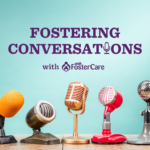
Foster parents learn in training classes about the uncertainty surrounding children in foster care. A child may be in their home for a few days, a year, or a lifetime. Grief and loss are a reality when a child is reunified. In this episode, we’ll explore how foster parents can get support to deal with the emotional stress of children leaving their home.
While loss affects people in different ways, many people experience the following symptoms when they are grieving. Just remember almost anything you experience in grief is normal.
Common symptoms of grief:
- Shock and disbelief—Right after a loss, it can be hard to accept what happened. You may feel numb and have trouble believing that the loss really happened, even deny the truth.
- Sadness—Profound sadness is probably the most universally experienced symptoms of grief. You may have feelings of emptiness, despair, yearning or deep loneliness. You may also cry a lot or feel emotionally unstable.
- Guilt—You may regret or feel guilty about things you did or did not say or do. You may also feel guilty about certain feelings. Sometimes, children will blame themselves for causing the loss, even though they did nothing wrong.
- Anger—Even if the loss was nobody’s fault, you may feel angry and resentful. You may feel the need to blame someone for the injustice that was done to you.
- Fear—A significant loss can trigger a host of worries and fears. You may feel anxious, helpless or insecure. You may even have panic attacks.
- Physical symptoms— We often think of grief as a strictly emotional process, but grief often involves physical problems, including fatigue, nausea, lowered immunity weight loss or weight gain, aches and pains and insomnia.
How to Support Others Who are Grieving
- Be a good listener
- Let them feel sad
- Do not minimize grief
- Do not be judgmental
- Share your feelings
- Ask about their feelings
- Acknowledge the pain
- Be available when you can
- Talk openly and honestly about the situation unless the person does not want to
- If symptoms of depression are severe or persistent and the person is not coping with Day to day activities, encourage the use of professional help
Other Resources:
- Saying Goodbye Handouts
- Grief and Finding Meaning ~ Unlocking Us Podcast
- Ambiguous Loss and Grief for Siblings in Adoption
Want to learn more about becoming a Foster Parent?






